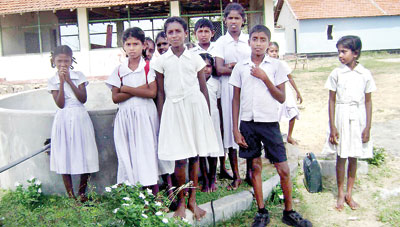Sunday Times 2
Protecting children from violence
I am very happy to contribute to this reflection on “Protecting Children from Violence” for UNICEF’s common communication and advocacy effort to mark the 25th anniversary of the Convention on the Rights of the Child.
The Church considers that children are the most precious gift that God has bestowed on humanity. Yet despite the Church’s vast worldwide contribution towards the education, health and welfare of the child throughout the ages, we need to acknowledge sadly that this is a teaching that she herself has not always listened to or respected.

Lack of adequate budgetary resources and personnel has seen a gradual weakening of both the extent and quality of education in rural schools in Sri Lanka
The stories and statistics about violence against children are truly horrifying. From reports of children in their thousands being killed and maimed in wars and conflicts or forced out of their homes to live as refugees, to those kidnapped, for ransom, to be sold off as cheap labour, or for sexual exploitation; Children forced into a life of labour and drudgery for economic reasons; of girls forced into marriage at very young ages or genitally mutilated for cultural reasons. There are also other kinds of ‘violence’ as well, more insidious and less in the limelight: Deprivation of the right to childhood, to innocence, to play and to laughter, of the very basic requirements of food, shelter and rest, of education, hygiene and healthcare, of psychological and emotional wellbeing.
These are but the tip of the iceberg of the abuse of children that goes on in the supposedly advanced civilisation of the 21st century we live in. These are the cruelties and shame that adults inflict on children under various pretexts and guises; be they political, on grounds of national sovereignty, fight against terrorism, and ideological claims of many hues, greed, gratification and selfishness.
If we consider the situation in our part of the world, South Asia, the global picture as reflected both in terms of reports and documentaries in the media, and statistics produced, for example by UNICEF itself, the picture is very mixed: Undeniable progress in some area such a secondary school registration, immunisation, adequate nutrition, use of toilets but very disturbing figures of neonatal and maternal mortality. The media frequently highlights incidences of gross sexual abuse of young girls, of children employed in appalling conditions, being sold off to virtual slavery or being used as child combatants.
Turning to my own country through consistent public welfare spending in such areas as health, education and nutritional support since the time of independence, Sri Lanka has made considerable progress in virtually all areas of child and maternity care, comparable to that achieved by countries with much higher income levels. However the picture is uneven and three decades of conflict and high military spending has had its

Rt. Rev. Dhiloraj Ranjit Canagasabey
impact.
One area I would like to focus on is education in the plantation and rural areas. Lack of adequate budgetary resources and personnel has seen a gradual weakening of both the extent and quality of education in the more remote rural as well as in the plantation areas (tea and rubber) of the country. Closure of primary and secondary schools in certain areas, sometimes due to the lack of teachers has meant that children are forced to relocate to schools further away from their homes, forcing them to spend many hours and money on travelling. It is not unknown to hear of children walking many kilometres to catch public transport to distant schools. The result is a fall both in their motivation and performance and moreover increased dropout rates from the formal education system caused by poverty and hardship. Another aspect to this issue is that closure of schools close to their homes forces children of minority communities to join schools where there are little or no opportunities for education in their mother tongue, or to learn their own religions or culture. It is our own experience that this situation has had an impact on children in certain semi urban areas as well.
It might seem that this is a relatively unimportant matter when compared to some of the more serious and pressing issues that children are faced with perhaps elsewhere. However if I may refer to the UN Convention on Child Rights, Article 30 specifically states that:
“In those States in which ethnic, religious or linguistic minorities or persons of indigenous origin exist, a child belonging to such a minority or who is indigenous shall not be denied the right, in community with other members of his or her group, to enjoy his or her own culture, to profess and practise his or her own religion, or to use his or her own language”.
There is of course a role to be played in the struggle for the protection and care of the world’s children for all of us. It is not only a matter for governments, local authorities, national or multi-lateral bodies such as UNICEF or for specialized NGOs alone. The message of the duty of adults — especially those who in their daily life and activities are called to work alongside or with children –must be made known, enforced and monitored.
Recognising that the Church had not always done enough to put into practice what we believe in and teach, the Church of England, the parent Church of the Anglican Communion put into place a child protection policy in 1995. Our own diocese of Colombo, which covers more than two thirds of the country has gone some way towards addressing these issues and began conscientising and educating, our congregations on the need to protect and improve the care of children and to bring them to the centre stage of our activities. These policies and practices have been put into place in our parishes and in the schools and institutions run by the church. We have as a policy established and run pre-schools in rural as well as some semi-urban and urban areas where we have assessed that there exists such a need. Teaching is done in the language of the children attending. We also join with other actors involved in children’s issues to lend our efforts and voices to this common challenge.
Another aspect of our mission is the strengthening of family life. The first and possibly the most important nursery which impacts on the holistic development of a child is the home and the family.
Building safe, comforting, loving and care giving homes based on sound moral or religious principles is the sacred duty of parents and the extended family. We have given high priority to this aspect of childcare, especially in the context of today’s consumerist society which promotes the theory that what you are is based on what you possess. We believe that this is probably the biggest contribution that faith-based organisations such as ours can bring to child care and protection.
I end this essay with the words of Nelson Mandela, the former President of South Africa:
“Safety and security don’t just happen; they are the result of collective consensus and public investment. We owe our children, the most vulnerable citizens in our society, a life free of violence and fear.”
(Rt. Revd. Dhiloraj Ranjit Canagasabey was installed as the 15th Bishop of Colombo in 2011 and is presently the presiding Bishop of the Church of Ceylon (Anglican). Bishop Dhiloraj is also the current Chairperson of the National Christian Council of Sri Lanka which regroups all the mainline protestant churches in the country)

